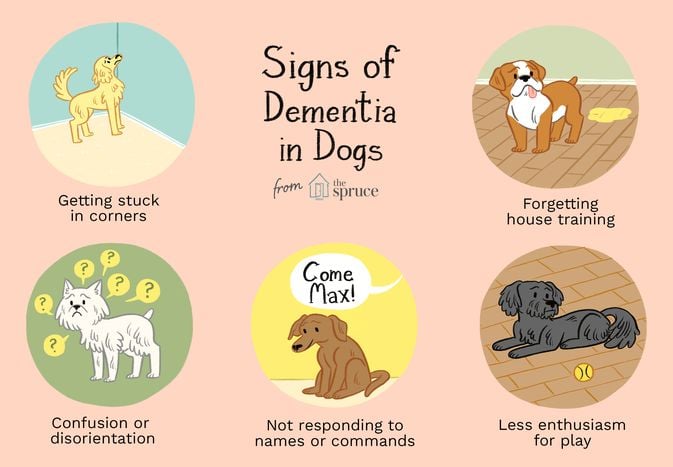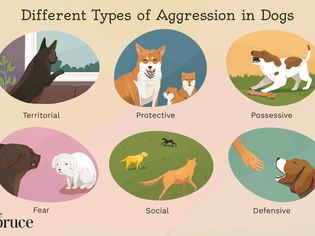Senior dogs, just like humans, can experience changes in the brain that affect memory, comprehension, and more leading to senility and dementia. It's not uncommon for dogs with dementia to experience symptoms including confusion, irritability, and disorientation. Even less severe occurrences, like a dog forgetting the daily walking route, can be indicators of this progressive disease.
Canine dementia can affect a wide variety of breeds but is more common in small and toy dogs. While there is no known cause behind the disease, a variety of treatment options like medication, exercise, dietary supplements, and setting consistent routines can manage symptoms.
What Is Dementia?
Dementia in dogs primarily affects memory, learning, and comprehension, similar to Alzheimer's disease in humans. Canine cognitive dysfunction, as the condition is officially named, affects a fairly high number of senior dogs. As your dog gets older, you may begin to notice worrisome behavioral signs that point to neurological problems. Yet with proper treatment and management, you can help your prized pet remain healthy and happy for as long as possible.
Symptoms of Dementia in Dogs
The symptoms of canine dementia are progressive, meaning they get worse over time. While these signs develop gradually, they may also appear to happen quickly during a stressful event. Any dog exhibiting symptoms of dementia should be seen by a veterinarian to rule out other health issues like blindness, deafness, urinary tract infections, kidney disease, arthritis, tumors, infections, or inflammation of the brain.
Confusion and Disorientation
You may notice your dog walking up to the wrong side of a familiar door, acting dazed—staring off into space like "nobody's home"—or wandering and pacing about your house. This general confusion and disorientation can work its way into every aspect of your dog's life, like forgetting where its food bowls are or going the wrong way on your usual daily walks.
Accidents in the Home
Canine dementia can also cause inexplicable accidents at home. Potty training requires consistency, similar to other routines around the house that your dog may forget as the disease progresses.
Anxiety
Confusion often leads to anxiety. Your dog may become stressed throughout the day and panic when left alone, whine, or shake due to feeling uncomfortable. Medication can help keep anxiety under control.
Unusual Sleeping Patterns
Doggie dementia can impair your dog's circadian rhythm. This affects sleep patterns leading to restlessness at night, tossing and turning, vocalizing, or standing "on guard."
Change in Temperament
Other symptoms of canine cognitive dysfunction can include a change in personality or temperament, lack of enthusiasm for games, and decreased interaction with loved ones. Your dog may also demonstrate aggressive behaviors or become scared easily because of confusion.
Causes of Dementia
A definitive cause of dementia in dogs is not yet known, but there are two developments in the brain that may lead to this disease. Small-breed dogs may also be more susceptible to dementia than larger breeds. The following are possible causes:
- Dopamine depletion: Canine cognitive dysfunction may be associated with the depletion of a neurotransmitter called dopamine, although the cause of the depletion hasn't been identified.
- Plaque or protein accumulation: Another possible cause is an accumulation of proteins or a build-up of plaque (similar to Alzheimer's) that disrupts nerve impulses.
Diagnosing Dementia in Dogs
If your dog is showing signs of senility or dementia, schedule a veterinary examination and consultation. Your vet will go over your dog's health history and conduct thorough testing. Diagnostic tests like blood work and urinalysis may be recommended to check for other senior health problems. Based on these findings, additional tests may be ordered, including X-rays, a CT scan, or an MRI.
Once other health issues have been ruled out, your vet might determine that your dog has canine cognitive dysfunction. While a diagnosis of dementia can be difficult to handle, many dogs go on to live happy, healthy lives when given proper care and attention.
Treatment
There is no cure for dementia in dogs. However, there are some treatment options that can make your dog more comfortable.
Medication
A prescription drug called selegiline can help alleviate some symptoms of cognitive dysfunction in certain dogs. This drug works by prolonging dopamine activity in the brain. Selegiline is given once each day orally and does not work for all dogs, but side effects are mild and uncommon unless the medication is inappropriately used in conjunction with other drugs like ephedrine, opioids, phenylpropanolamine, amitraz, or several classes of antidepressants.
Supplements
Supplements such as omega-3 fatty acids, SAMe, medium-chain triglycerides (MCT), antioxidants, Denamarin, silybin, vitamin E, Cholodin, Solliquin, and melatonin seem to improve cognitive function or quality of life for some dogs. Talk to your veterinarian for information about dosage and help with finding the right supplements for your dog. There are also homeopathic treatments, herbal remedies, and other nutritional supplements said to benefit dogs with cognitive dysfunction. One of these is called Neutricks (apoaequorin), which is made from a calcium-binding protein found in a specific species of jellyfish. Chinese herbs may also be helpful for some dogs. Consult a veterinarian who practices traditional Chinese veterinary medicine and acupuncture for more information on these methods.
Supportive Care
Additional practices include developing a daily routine for feeding, exercise, and other activities. Routines must be kept consistently. Ensure your dog gets plenty of exercise, ideally out in the sun, and drinks enough water. This helps manage its level of anxiety and promotes nighttime sleep. Soothing music and aromatherapy may also help some dogs feel comfortable. Spend quality time together, strengthening the human-canine bond, and don't leave your dog home alone for extended periods of time. Owners should also avoid rearranging the furniture, moving the dog's belongings, or making any other changes in their living environment.
Prognosis for Dogs With Dementia
The unfortunate reality of dementia is that since this progressive disease does not have a cure, dogs diagnosed with canine cognitive dysfunction will eventually succumb to the illness. Thankfully, dementia tends to affect senior dogs (rather than beginning early in life), and the available treatment options can help these dogs live comfortably for some time. Owners of dogs diagnosed with this disease should talk to their veterinarians about the prognosis for their specific dog, which treatments are preferable, and what to expect moving forward.
How to Prevent Dementia
There is no specific way to prevent canine dementia, but ensuring your dog is active and mentally stimulated can keep its mind sharp for many years. These options are helpful ways for owners to help their dogs stay healthy:
Mental Stimulation
Teach your dog fun tricks and games. Options that challenge its brain (and those it can play throughout its life) are best. Even senior dogs can benefit from mentally stimulating activities like playing with puzzle toys, learning simple commands, and socializing with other dogs and people.
Healthy Diet
It's important to feed your dog a high-quality diet void of fillers and maintain a proper exercise routine. Certain dietary supplements can also help promote brain health throughout different stages of life. Your veterinarian can help you determine a healthy exercise schedule and the best supplements for your specific dog based on its age and nutritional needs.










Comments on " Dementia and Senility in Dogs" :